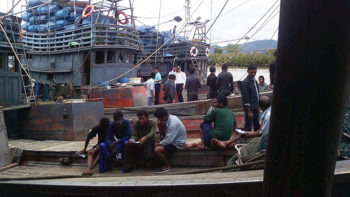
‘Slavery is not yet ended’, said Archbishop Sanchez Sorondo of the Pontifical Academies of Sciences and Social Sciences Slavery at the 24th World Congress of the Apostleship of the Sea (AoS) in Taiwan.
The Congress titled, ‘Caught in the Net’ focused specifically on the welfare and lives of fishermen around the world.
Cardinal Turkson, who heads the Dicastery for Promoting Integral Human Development, in which AoS sits in the Vatican noted that this aspect of AoS’s work is directed to nearly 38 million people engaged in fishing, where abuse can often go unseen out at sea, AoS’s work with fishermen is a vital part of the Church’s work of evangelisation, he noted.
A paper by Cristina De Castro, from AoS in Vigo, Spain, noted the profound ramifications that slavery and forced labour in the fishing industry have for the wives and children of those working at sea.
Cardinal Bo of Myanmar observed that “A culture of indifference prevents us from seeing sea slaves and fishermen who are modern day refugees living and working in lawless seas”. The globlisation of indifference must be a challenge to the Christian life, he said.
Amongst the experts who addressed the Congress was Sebastian Matthew from The International Collective in Support of Fishworkers, who explained that in many poorer countries small scale fishermen often operate at little more than subsistence level.
Mick Duthie of the Santa Marta Network noted that fishing is “connected to everyone – look at the fish on your plate”. Cardinal Bo highlighted that the Thai seafood industry, the third largest in world, is sustained by migrant labour, including many youths from Myanmar. “Christ is crucified in our brothers and sisters today,” said Cardinal Bo at the Congress.
The United Nations, ILO Work in Fishing Convention, which comes into force this November, was warmly welcomed as a means of improving the welfare of fishermen. Cardinal Bo noted that currently 25 million fishermen have little or no legal protection, which will change with the implementation of the fishing convention.
Cardinal Bo also said that ‘Sea Sunday’ needs to be a mandatory worldwide celebration across the Catholic Church to prevent Church congregations remaining ignorant of the plights of seafarers and fishermen and the work of the Apostleship of the Sea.
The value of AoS’s work around the globe was underscored by Mick Duthie of the Santa Marta Network, an anti-trafficking group. “Without your people, many victims would struggle to survive,” he said. The work of AoS to promote seafarers’ rights and the value of their seafarers’ wives associations around the world were applauded.
Delegates were also presented with the results of an audit of the global work of AoS by John Green, AoS GB Director of Development. His survey detailed the work of over 1,000 port chaplains and volunteers worldwide. It showed that AoS is by far the largest global seafarers’ welfare organisation, visiting 70,000 ships per annum.
Concluding the Congress Fr Bruno Ciceri, AoS’s international secretary highlighted three priorities for AoS’s work with fishermen; Ensuring port chaplains visit fishing ports, raising awareness amongst consumers of human rights abuses in the fish supply chain and responding to Cardinal Bo’s ‘SoS to AoS’ to establish an AoS ship visiting team in Myanmar.
At the closing Mass Bishop Thomas Dowd, AoS Canada Bishop Promoter, challenged delegates with the question ‘How can we strengthen the raft of AoS, as a fellowship that can carry us and others so that they may be saved’? Plans to address this question are to be drawn up and implemented throughout AoS before it celebrates its centennial conference in Glasgow in 2020.
Source: Apostleship of the Sea